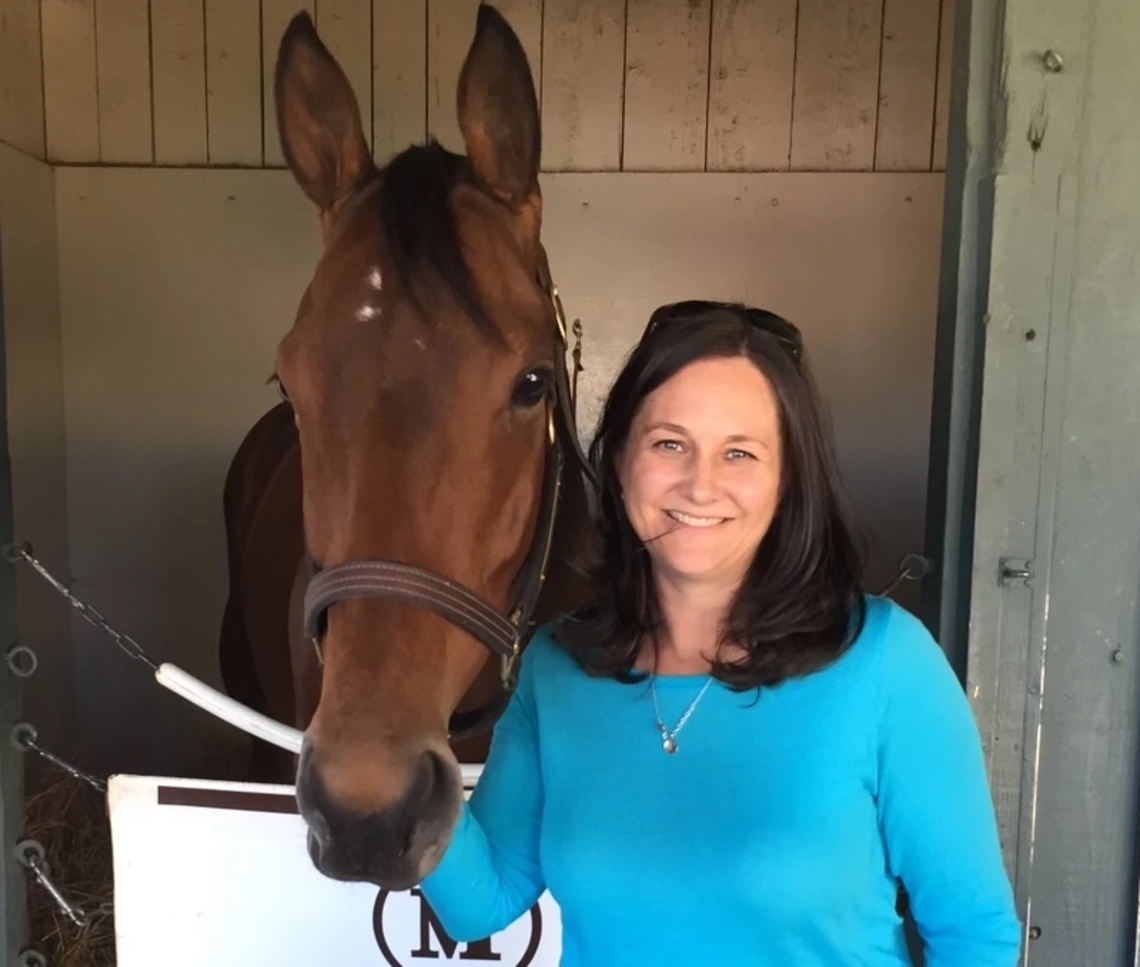My RTIP Story: College Program Pivots Lovitt’s View On Racing, Leads To Key Role In Aftercare

California Retirement Management Account (CARMA) executive director Lucinda Lovitt remembers a time when a career in the Thoroughbred racing industry was the furthest thing from her mind.
An Arizona native who grew up riding competitively on the show circuit, what she remembers from her early work with horses was her passion for the animals and her passing disdain for a sport with an often-maligned public reputation.
“I think like most young girls who end up riding horses, I became fascinated with them at a very young age,” said Lovitt. “I was seven when I started taking riding lessons, having nagged my parents enough into a summer camp package. That led to more serious riding, and I did that competitively from the time I was seven until I finished college competing primarily in Arizona and all over the southwest.”
The University of Arizona was the only college choice for Lovitt, whose family now boasts four generations of graduates. As an animal lover, her plan from the jump had been to take the pre-veterinary track, but it was soon clear that path wasn't exactly what she wanted.
“I was sure that I wanted to be a horse vet,” said Lovitt. “Then I looked at the first-semester course load for pre-vet, and I thought, 'Maybe this is not for me.'
“I was actually introduced to racing through my connections in riding because I rode at the same barn as Wendy Davis, the former director of the Race Track Industry Program. I didn't know what to do for my major and it was at a horse show that Wendy said, 'You should take my intro to racing class that I teach.' I kind of scoffed at the time and said, 'Oh, horse racing is horrible Wendy, you know that, and we all know they're mean to their horses.' But she was firm, and she said, 'Just take my class and tell me what you think.' I had no major, and no idea what I wanted to do, so I took her class, and I was fascinated by it. So, I took another class and another and another …”
Four and a half years from that first class, Lovitt was set to graduate from the RTIP. The only missing component was her internship, a critical piece of the program that she had yet to complete. At the time, Lovitt was still convinced that her future career would lead her away from racing, despite her continued interest in the sport.
“I was still riding and competing, but I hadn't done and internship with the RTIP which is a big component of the program,” said Lovitt. “Finally, Wendy said, 'I'll set you up, but you need to do an internship. You can go to Turf Paradise, go up there for the last three months of their meet, and hop through all the departments.' So that's what happened. But while I was up there, a job posting came into the office for Thoroughbred Owners of California which was looking for an owner's liaison. Wendy called me and said, 'I have the perfect job for you in racing.'
“I was still thinking that I wasn't going to work in racing, that I was going to go back to Tucson to work for my dad. But Wendy told me that a woman from TOC was coming to town, and she wanted me to take an interview with her. I said yes, but I didn't take it at all seriously. I didn't have my resume so while I was at Turf Paradise, I had to recreate it from memory and fax it off to them. Then I was late to the interview because I couldn't find parking and my parking permit had expired … it was a comedy of errors, but I got the job. They flew me to California, I met with John Van de Kamp, the president of TOC. I was 22 and it was the scariest thing I'd ever done in my life. I took the job, left the internship halfway through, packed up my stuff and I moved to California. That's how I got into horse racing – completely unintentionally.”
Lovitt spent 14 years with TOC moving up the ranks from assistant liaison to taking on more and more responsibility in the organization. The skills that she had been taught at the RTIP — the same skills that had once seemed so abstract — were indispensable in helping her build relationships with colleagues and horseman in her adopted state of California.
“The longer I was at TOC, I went from assisting owners to licensing and other basic tasks, to managing programs and committees working with the board, negotiating race meet agreements between horsemen and racetracks, and providing support to board members working with conditions or house rules, etc.,” said Lovitt. “If I hadn't had classes that made us create a fictitious two-week condition book, I wouldn't have been able to work through that effectively.
“Those classes helped me feel like I had the basic knowledge of the racing industry, in particular on the business side. For someone who isn't a gambler and who is not someone who comes from a history of racing, those business classes were critical. For my job, I needed to understand what simulcasting was, what takeout was, what a condition book was, and how to build one. Until you get into a job and are working it in real-time, things you learn in the classroom are theoretical. What you learn in the job is so much more than what you learn in the classroom, but the RTIP is a well-rounded introduction to what racing really is. It's a niche business and this program fits that. You have the opportunity in the RTIP to dive in as deep as you want to dive.”

